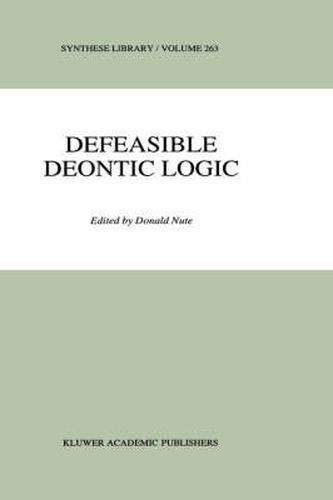Readings Newsletter
Become a Readings Member to make your shopping experience even easier.
Sign in or sign up for free!
You’re not far away from qualifying for FREE standard shipping within Australia
You’ve qualified for FREE standard shipping within Australia
The cart is loading…






This title is printed to order. This book may have been self-published. If so, we cannot guarantee the quality of the content. In the main most books will have gone through the editing process however some may not. We therefore suggest that you be aware of this before ordering this book. If in doubt check either the author or publisher’s details as we are unable to accept any returns unless they are faulty. Please contact us if you have any questions.
This text explores the applicability of current work in nonmonotonic logic to normative reasoning. Classical deontic logic is monotonic, meaning that any conclusion derivable from some set of premises remains derivable when new premises are added. But normative reasoning involves prima facie obligations, conditional obligations, and the precedence of one normative principle over another. An acceptable argument may be defeated by a new line of reasoning when new information activates competing normative principles. The failure of classical deontic logic to model these features leads to paradoxes, and moral theorists generally respond by ignoring deontic logic. The volume presents new models for normative reasoning relevant to philosophy, law, management and artificial intelligence. Researchers in moral theory, philosophical logic, philosophy of law, legal reasoning, organizational theory in business, decision support systems, expert systems, knowledge representation, deontic logic, nonmonotonic logic, and automated reasoning should find this text of interest.
$9.00 standard shipping within Australia
FREE standard shipping within Australia for orders over $100.00
Express & International shipping calculated at checkout
This title is printed to order. This book may have been self-published. If so, we cannot guarantee the quality of the content. In the main most books will have gone through the editing process however some may not. We therefore suggest that you be aware of this before ordering this book. If in doubt check either the author or publisher’s details as we are unable to accept any returns unless they are faulty. Please contact us if you have any questions.
This text explores the applicability of current work in nonmonotonic logic to normative reasoning. Classical deontic logic is monotonic, meaning that any conclusion derivable from some set of premises remains derivable when new premises are added. But normative reasoning involves prima facie obligations, conditional obligations, and the precedence of one normative principle over another. An acceptable argument may be defeated by a new line of reasoning when new information activates competing normative principles. The failure of classical deontic logic to model these features leads to paradoxes, and moral theorists generally respond by ignoring deontic logic. The volume presents new models for normative reasoning relevant to philosophy, law, management and artificial intelligence. Researchers in moral theory, philosophical logic, philosophy of law, legal reasoning, organizational theory in business, decision support systems, expert systems, knowledge representation, deontic logic, nonmonotonic logic, and automated reasoning should find this text of interest.